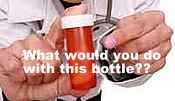Sock it to ’em, Sheila of TPA-UK! She has asked some STRONG questions!
(Side note: I feel so stupid. If you have signed up to receive notification of STTM’s blog posts (see signup on left below links), I have inadvertently failed to check a particular box for the emails to go out. I won’t make that mistake again. See the two posts below, which you weren’t notified about when they came out. )
 I recently chatted with Sheila Turner, a thyroid patient advocate in the UK who runs the website Thyroid Patient Advocacy–United Kingdom.
I recently chatted with Sheila Turner, a thyroid patient advocate in the UK who runs the website Thyroid Patient Advocacy–United Kingdom.
And she has become absolutely disgusted at what is happening in the UK–disgusted enough to stop being polite and to ask direct and pointed questions on the home page of her TPA-UK website.
What spurred her tough new stand? Says Sheila, “The RCP (Royal College of Physicians), BTA (British Thyroid Association) et al are doing everything they can to boycott all T3 containing products and their latest ‘Statement’ on the diagnosis and management of primary hypothyroidism is banning general practitioners from prescribing T3 at all.“.
And, explains Sheila, it’s gotten to the point where most any General Practitioner is completely afraid to prescribe T3 or any T3-containing product like natural desiccated thyroid for fear of being reported. “The ONLY people allowed to recommend that T3 be prescribed are “accredited endocrinologists”, says Sheila. (And how many patients have experienced how close minded Endo’s can be towards desiccated thyroid.)
And here are her brilliant, in-your-face questions with links, which are pertinent for ALL of us, whether in the UK or not:
- WHY do the GMC, the RCP, the BTA et al. deliberately choose to ignore the scientific evidence that has been available for over 40 years ?
- WHY are medical associations ignoring the 13% failure rate of T4-only therapy for the past 50 years? Why are patient’s complaints dismissed?
- WHY has there been no correction to the RCP statement when there are patients who are counterexamples to the validity of T4-only therapy?
- WHY is the confusion of two definitions for ‘hypothyroidism allowed to continue?
- WHY are guideline authorship and concise guidance to good practice protocols ignored?
- WHY are individual symptoms of hypothyroidism stated to be “non-specific” when Baisier found groups of these symptoms may be quite specific?
- WHAT further investigations for non-thyroidal causes are recommended as relevant to the symptoms of hypothyroidism when pituitary and thyroid GLAND function tests are biochemically normal — Levels of fT3, rT3 and adrenal levels?
- WHY are the studies by Das (2007) and Lewis (2008), which found that patients could be successfully treated with thyroid extract being ignored?
- WHY is medicine ignoring false negative test results?
- WHY do doctors refuse to explain and/or justify their decisions, thereby withholding information necessary for valid consent to treatment?
- WHY does the NHS refuse to take steps to protect human rights when sufferers are put at risk through a disregard of the demand that patients should be treated with fairness, respect, equality, dignity and autonomy?
- WHY are laboratory discrepancies in serum testing being ignored?
I appreciate the tough stand Sheila is taking. We HAVE to take a strong stand in light of the worldwide ignorance about 60 years of patient suffering on T4 meds like Synthroid, Eltroxin et al, about better treatment with natural desiccated thyroid and T3 products, and about the lousy TSH lab test!
In fact, in light of practically NO mass media attention to this huge worldwide thyroid treatment scandal, we have to shout it wherever we can and hope that some WISE reporter or media personality gets this and will shine a media light at the idiocy going on out there towards thyroid patients. Stop the Thyroid Madness!â„¢




